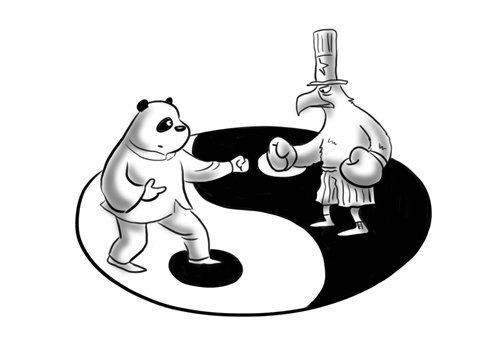A way out in Sino-US standoff needed
Global Times
1527201289000

Illustration: Liu Rui (Photo: Global Times)
For most of the four decades of China's reform and opening up, the United States has been the "foreign nation" that has had the most significant impact on China. This influence has seeped into all aspects of Chinese society and life.
But in the last 10 or so years, such one-way influence has begun to change. With China becoming the world's second-largest economy, its impact on the US and the world is rising.
Although this influence has not been as extensive as that of the US on China, the American and international media keeps talking about China issues almost every day.
Reshaping China has always been the most important goal of Washington's China policy. For 40 years, this policy goal has been gaining strength.
The purpose of trying to reshape China is simple. It is to mould China into a country that meets various American standards including politics, economy and legal, on the national and international fronts.
Looking at it historically, this is due to the unique missionary zeal of the Americans. It also comes from the American proclivity to impose its stance on the world.
Now, the US has hit bumps in its attempt to reshape China. Some of the American elite have realized that China may not follow the US "road map" and the pipe dream of bringing around the country to its point of view remains that.
A rethink of the China policy emerged more than a decade ago, advising the White House to get prepared to face a different China in the long term.
This view has now gone mainstream, giving shape to the general opinion: Since we cannot change you, we will stick to our rule of the game. The policy manifestation is: Since we cannot use "influence" to mould China the way we wished, we should change our way of communicating with the country, and must use a tougher approach to block the Asian nation's expansion.
In China, some tough views have also emerged in taking on US challenges while going through the trade war. While some raised the slogan, "Give China another 10 to 20 years for focused development," others vowed to fight the US with self-sufficiency in the manufacturing and technology sectors. Both views are based on the belief that Sino-US confrontation is a contest of power, and strength determines the outcome.
In fact, it is not appropriate to use the term "war" to describe the current trade problems between China and the US because the only way to solve these problems is to negotiate rather than slug it out in a war. Second, this is a long process of bargaining. It is a matter of how to strike compromises and both sides need to learn to take a step back.
The trade negotiations point to an important fact of bilateral ties - talks could become a fundamental way for China and the US to get along in the future.
Therefore, future development of Sino-US relations is not about one winning at the cost of the other or that one will replace another, or that the two should align with a single standard.
It is about living together in peace - that is where the future lies.
The United States hopes to reshape China according to its standards because it has been the leading power in changing the world after WWII.
It is easy for Chinese people to have a similar view of power because of US influence.
But the situation has dramatically changed since China became a major player on the international stage. That's why President Xi Jinping suggests the two countries should find a way to build a new type of major-power relationship.
What could be more important is how to find a way out in the US-China standoff when China can shape the relationship and the international system that is acceptable to the world.
About 10 years ago, I wrote an article to raise the issue of shaping the US view on China. Today, it may be more important to stress its importance, especially when the "war" is drawing attention in both countries.
How to change the US view on China will depend to a large extent on our own reforms and opening-up, and our ability to shape the world order.
We will not follow the American logic by raising the bogey of the Thucydides Trap. During the process of doing away with this logic China will go toward becoming a great power in the world.


